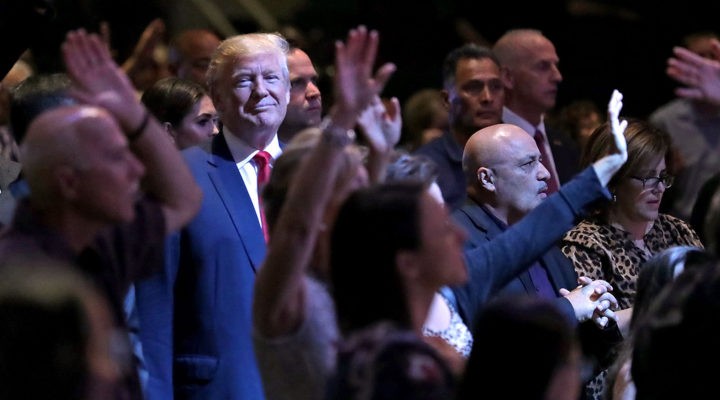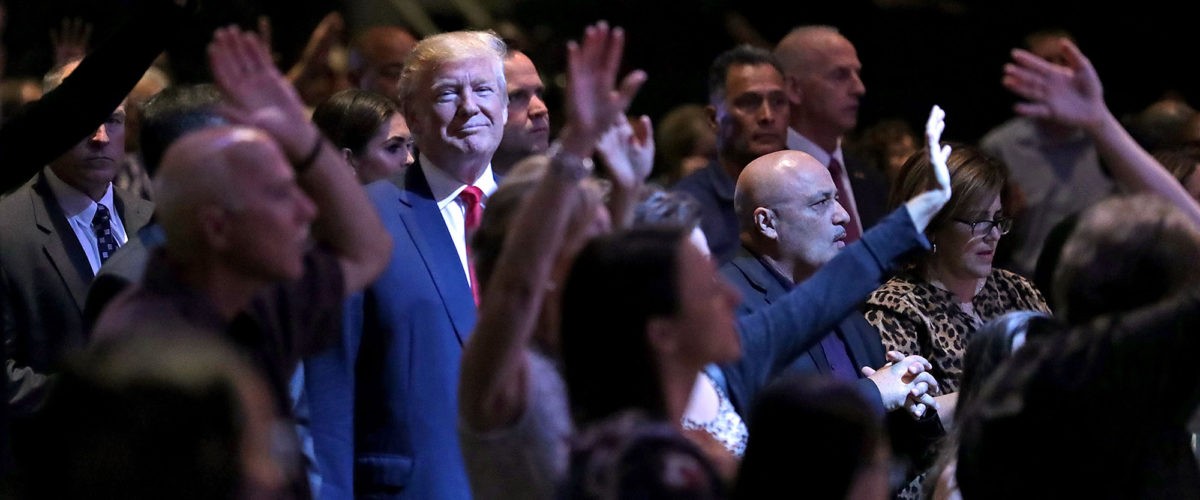More than his recent and unprecedented indictment, Donald Trump should be fearful of losing his evangelical base to another candidate willing to toe the line on evangelical orthodoxy on social policies.
At least, that’s what pundits, politicians and pollsters are all saying right now — everywhere from the left-wing and contrarian Slate to the “Unsafe” newsletter of the provocative, paleoconservative and polemical Ann Coulter.
Athough they comprise only 14.5% of the population, white evangelicals have wielded enormous national political power for decades. Sociologists, journalists, political strategists and historians have, especially in recent years, discussed this ad nauseum in a Jesus and John Wayne world.
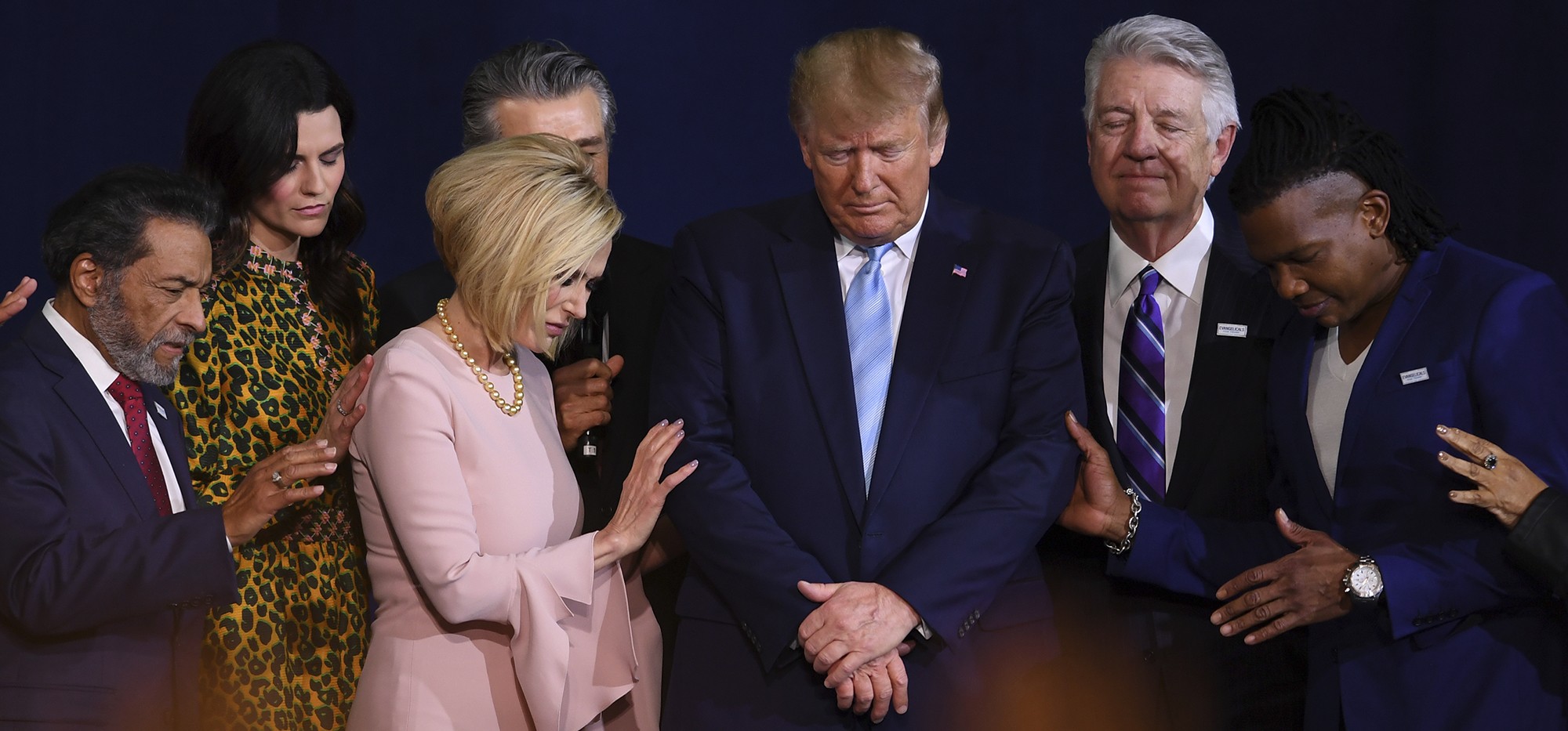
A group of religious leaders gather around Donald Trump on Jan. 3, 2020, at an “Evangelicals for Trump” coalition launch. At left, Paula Cain-White, and at right, Jack Graham. Z(PI04/MediaPunch/IPX)
For the past two presidential elections, Trump effectively cornered the market on evangelicals. But just four months away from the Republican National Committee’s first presidential primary debate, this sizable sect is now a toss-up for prospective Republican aspirants — so much so that Trump has accused evangelicals of “disloyalty.”
From whence come these changing politico-religious tides among one of the nation’s most coveted voting blocs?
Depending on who you ask, the answer will be anything from Trump’s criticism of some evangelicals’ abolitionist approach on abortion, to private floundering on LGBTQ issues, or even perhaps his incessant whining on social media.
‘He used us’
Amid widespread Republican disappointment for their abysmal showing in the 2022 midterms, Trump suggested the GOP’s position on abortion was too extreme for most Americans.
This did not go over well with Trump’s most dedicated demographic and quickly became a stumbling block to abortion-hating evangelical culture warriors.
The revulsion to Trump’s rhetoric was potent enough to see Scott Walker, the former Republican governor of Wisconsin, tell The Atlantic that he and others had privately queried “if in some way he’d gone back to some of the sentiments he had long before becoming a Republican candidate.”
Others had more dismayed reactions.
“Donald Trump can’t save America. He can’t even save himself. He used us to win the White House. We had to close our mouths and eyes when he said things that horrified us. I cannot do that anymore,” Mike Evans, a former member of Trump’s evangelical faith advisory board, confided to the Washington Post.
What’s more, while Trump pleased his evangelical acolytes when he banned transgender people from serving in the military in 2019, he was hailed just days afterward as the “most pro-gay president in U.S. history.”
One can scarcely visualize the Robert Jeffresses of the world grinning at such a prospect.
Slate and The Sanctimonious One
In lieu of Trump and his perceived squishy social sympathies on abortion and LGBTQ issues, evangelicals are racked with consternation over viable alternatives who are more closely aligned with their Billy Graham mores.
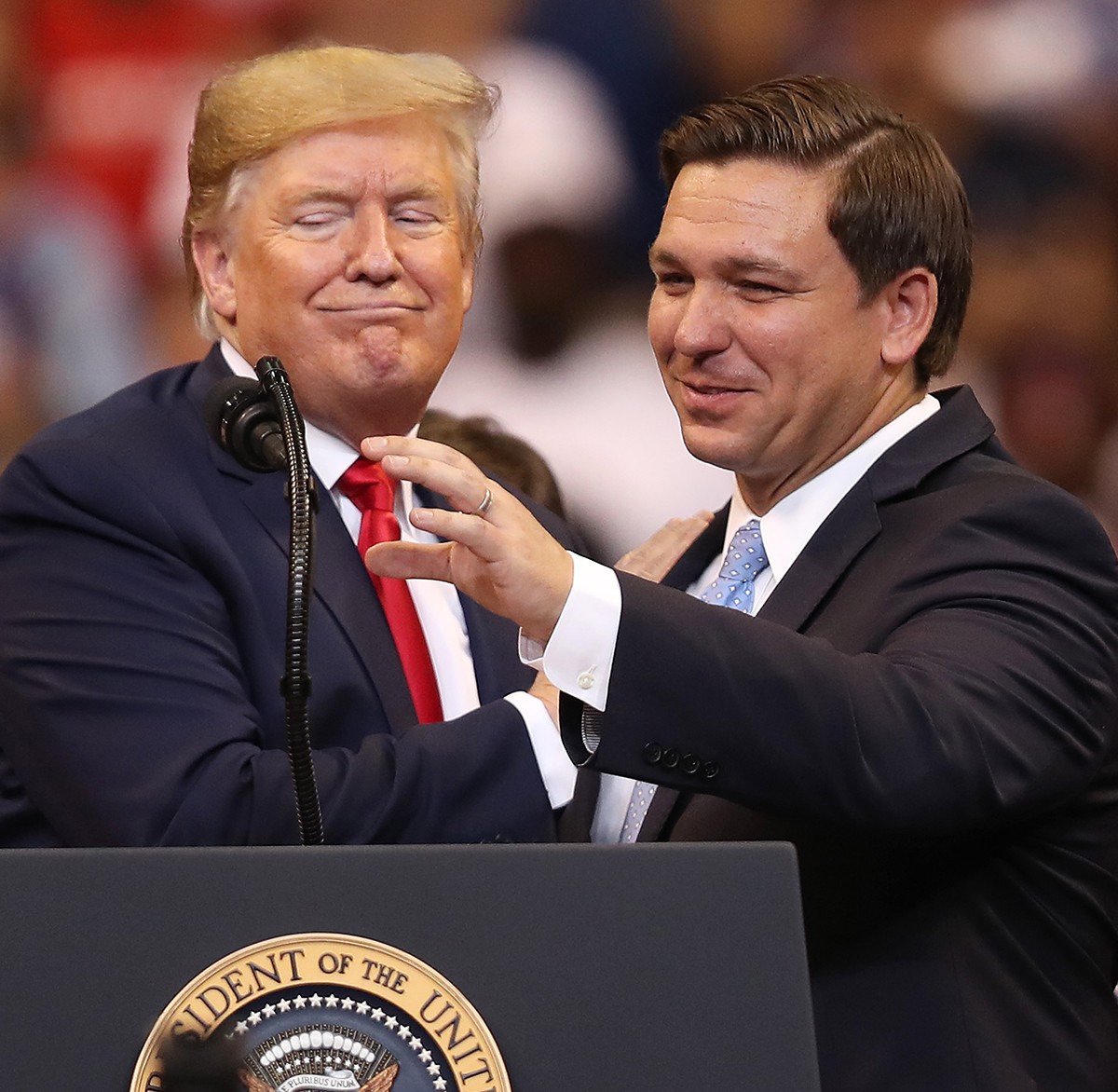
Donald Trump introduces Florida Gov. Ron DeSantis during a homecoming campaign rally Nov. 26, 2019, in Sunrise, Fla. (Photo by Joe Raedle/Getty Images)
The front runner? Trump’s newfound nemesis: Ron DeSantis. Or, as Trump has infamously (fittingly?) dubbed him: Ron “DeSanctimonious.”
Such momentum has the evangelical-DeSantis train garnered, that Slate recently ran a profile of the Florida-based Southern Baptist Convention presidential runner-up, Tom Ascol.
Ascol had recently prayed at the DeSantis inauguration, and observant commentators (including this veteran, but now recovering, Southern Baptist) saw exactly what was happening. It was nothing less than the forging of a new hyper-conservative and anti-woke alliance that would transcend the parabolical “great gulf fixed” between politics and religion in American life.
It was a match made in heaven (or hell, depending on who you ask).
Who else than Tom Ascol could be more qualified to provide spiritual advice to the full-time cultural combatant and part-time governor? Ascol was the man whose denominational platform revolved around eradicating women from the pulpit, purging any vestiges of Critical Race Theory from Southern Baptist seminaries, and holding women criminally accountable for having abortions.
And DeSantis, after all, had just recently consummated his “hostile takeover” of Florida’s New College in the name of eradicating the “left-wing racialist ideology” within the school’s small and fledgling office of diversity, inclusion, and equity.
As if that wasn’t enough, in addition to signing a 15-week abortion ban, evangelicals’ new political mistress is wisely backing a heartbeat bill to further endear him to his impassioned right-to-lifers.
Birds of a feather flock together.
One could almost hear the latent liberal terror at the prospect of an evangelical and DeSantis alliance in the menacing Slate headline — almost as if a DeSantis presidency would be as disastrous (if not more) to progressive causes as Trump’s!
The online outline trembled, “This Man Could Steer Evangelicals from Trump to DeSantis. Will He?”
The fears are justified.
MAGay?
Political analyst Jacob Lupfer in a recent RNS column insightfully opined that “DeSantis wages war on trans people and demonizes anyone who advocates for LGBTQ people” whereas “Trump has a record of catering to gay Republicans.”
That thesis, it seems, carries an indisputable veracity.
A little more than four months ago, Trump hosted a gala for Log Cabin Republicans at Mar-a-Lago. This immediately drew the ire of Rod Dreher, who quipped, “Somebody’s being made a fool of here, and I don’t think it’s the Log Cabin Republicans.”
DeSantis, meanwhile, was preparing for an expansion of his so-called “Don’t Say Gay” bill.
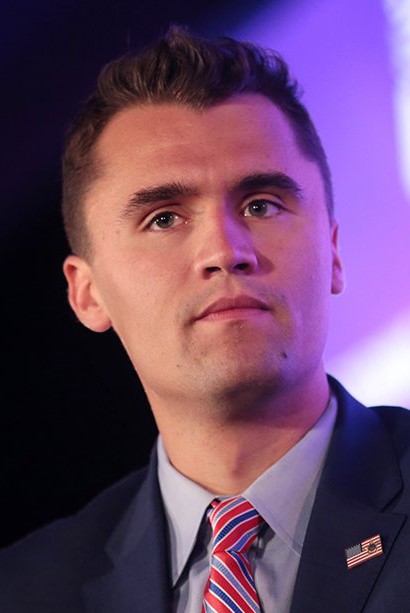
Charlie Kirk
In the minds of the most conservative evangelicals, DeSantis and Trump’s views on these critical social issues cannot coexist without one setting the other on fire.
Not even the flagship alt-right commentator Charlie Kirk of Turning Point USA has been safe from scathing conservative evangelical criticism for agreeing that Republicans “don’t really see (gay rights) as an issue anymore.”
But nothing could be further from the truth for the evangelical voting bloc.
Research proffers that 55% of evangelical Protestants believe homosexuality should be actively discouraged in society. Among that vast subgroup, a stunning 88% are over the age of 29, including a whopping 56% of evangelicals aged 50 and up — a generational demographic Trump has historically dominated.
Put simply, if Trump wants to harness the voting power of white evangelicals, he needs to get with the program on evangelical beliefs on sexuality.
“If Trump wants to harness the voting power of white evangelicals, he needs to get with the program on evangelical beliefs on sexuality.”
While Trump may have been content to celebrate the 14% of LGBTQ people who voted for him in 2016 or grinningly hold up a Pride flag at a rally, evangelicals writ large reject queer identities and LGBTQ-friendly policies.
Some even view homosexuality as so perverse that it should be illegal. Case in point: As recently as November, Southern Baptist Theological Seminary President Al Mohler delightfully pondered on his podcast if homosexuality and adultery should be criminalized in the name of “ordered liberty.”
‘Heavy D’ and The American Voltaire
But most damningly, the conservative controversialist Ann Coulter (commonly nicknamed “The American Voltaire”) eviscerated Trump with a simple but stinging criticism in a defiant March column: “Heavy D (that is, Ron DeSantis) Don’t Tweet, He Acts.”
This, lest we forget, is the same Ann Coulter who, just three days after Trump’s 2015 candidacy announcement, infamously predicted (to scoffs and laughter) on Bill Maher’s HBO talk show that the former star from The Apprentice would win the Republican primary.
It is also the same Ann Coulter who wrote the 2016 New York Times bestseller In Trump We Trust: E Pluribus Awesome!
These days, Coulter is singing a different tune, going so far as to declare to The New York Times last year, “The best thing that could have happened to the Republican Party (and the country) would have been for him to be vaporized at the moment he was announcing his victory.”
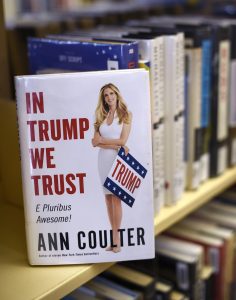
A book by conservative writer Ann Coulter titled ‘In Trump We Trust’ is among the books available at a public library in Santa Fe, New Mexico. (Photo by Robert Alexander/Getty Images)
For Coulter’s part, the scathing criticism of Trump has mostly to do with her disappointment in the former commander in chief’s failure to deliver on key campaign promises concerning crime and immigration. The social policy concerns of evangelicals seem distant.
“Hey, whatever happened to that wall?” she probed in the newsletter.
But evangelical concerns have certainly not escaped her sight, either. Coulter, after all, once infamously pronounced she was “a Christian first and a mean-spirited, bigoted conservative second” after critics intimated that she wasn’t exactly the most Christ-like pundit.
In an odd twist, Coulter, a self-identified Presbyterian, tweeted out a Timothy Keller sermon last Christmas. Keller is a prominent Manhattan-based retired evangelical megachurch pastor who has come under fire by right-wing evangelicals in recent years for his winsomeness. He also once drew the ire of Critical Race Theory warrior and atheist hoaxer James Lindsay who said he was a “demon” and mocked Keller’s Stage IV pancreatic cancer diagnosis.
Coulter’s personal religious life aside, her zesty zingers and impassioned pericopes amid an anti-transgender screed in her recent newsletter eloquently summarize the uneasy political conscience of evangelicals at present:
Counterfactual self-identifications are popping up all over. For example, the media are currently self-identifying as purveyors of information, and Trump is self-identifying as a bad-ass tough guy who can get the job done. … I’m not allowed to offer a professional opinion without conducting an examination, but based on the symptoms, there’s a good chance that Trump is a liberal white woman.
“There’s a good chance that Trump is a liberal white woman.”
There are several reasons for Coulter’s assessment of Trump as sentimentally squishy and politically impotent on matters important to evangelical conservatives.
Chief among these, according to another recent Coulter newsletter, were the issues of transgender people participating in sports leagues that coincide with their personal gender identity and gender-affirming medical care for transgender youth under 18:
It was during Trump’s first year in office that biological men competing in women’s events destroyed women’s soccer and track and field in Connecticut, an absurdity that quickly spread to the rest of the country. Trump did nothing about it, unless you count a strongly worded tweet. (Heard of Title IX?) … The entire transgender craze kicked off during the Trump administration, and it continued unabated throughout the Trump administration.
Coulter then was quick to praise DeSantis, whom she noted signed a law prohibiting transgender women from participating in women’s sports and for urging medical boards in Florida to ban what advocates say is “gender-affirming care,” but what Coulter and other evangelicals call “the poisoning and mutilation of youth.”
Anti-Trump, non-Trump, or some other third, worse thing?
Aside from the inviolable proclamations of political damnation from anti-LGTBQ and anti-abortion evangelical leaders and pundits, others in the hyper-politicized evangelical industrial complex may simply seek to steer clear of the recently indicted president.
Especially as the beginning of the Republican primaries draws closer, observers can reasonably expect candidates seeking evangelical favor to further distance themselves from Trump. As late as April 2, former governor of Arkansas and Bob Jones University alumnus Asa Hutchinson clarified in his candidacy announcement that while he is not “anti-Trump,” he is decidedly “non-Trump.”
Presumed nominee and GOP darling DeSantis has (perhaps wisely) abstained from even mere “non-Trump” pronouncements. Instead, true to Coulter’s words, he has adopted a policy of radio silence and letting his widely acclaimed conservative policies speak for themselves. Although the Florida governor recently wisecracked of Trump, “I don’t know what goes into paying hush money to a porn star to secure silence over some type of alleged affair,” DeSantis has refrained from excessive commentary and a premature candidacy announcement.
As major evangelical denominations continue their years-long reckoning with issues of race, the roles of women, sexual ethics, and abuse by clergy, there is an even stronger possibility that amid Trump’s recent indictment, disenfranchising of evangelical culture warriors and continued social media meltdowns that major evangelical power players will also distance themselves from Trump or play a political “quiet game.”
Who exactly will fill Trump’s hallowed place remains to be seen — although Ann Coulter has an idea.

David Bumgardner
David Bumgardner is a former Clemons Fellow with BNG. He is a former Southern Baptist and holds a bachelor’s degree from Southwestern Baptist Theological Seminary and now is a licensed evangelist with the Anglican Mission International. He is looking forward to graduate theological study at Duke Divinity School in fall 2023. Follow him at www.davidbumgardner.org.
Related articles:
On the indictment of a president | Opinion by Mark Wingfield
Tom Ascol endorses Ron DeSantis and Christian nationalism in weekend campaign rally invocation
Former RNC head calls new DeSantis ad ‘ass-backwards blasphemy’

